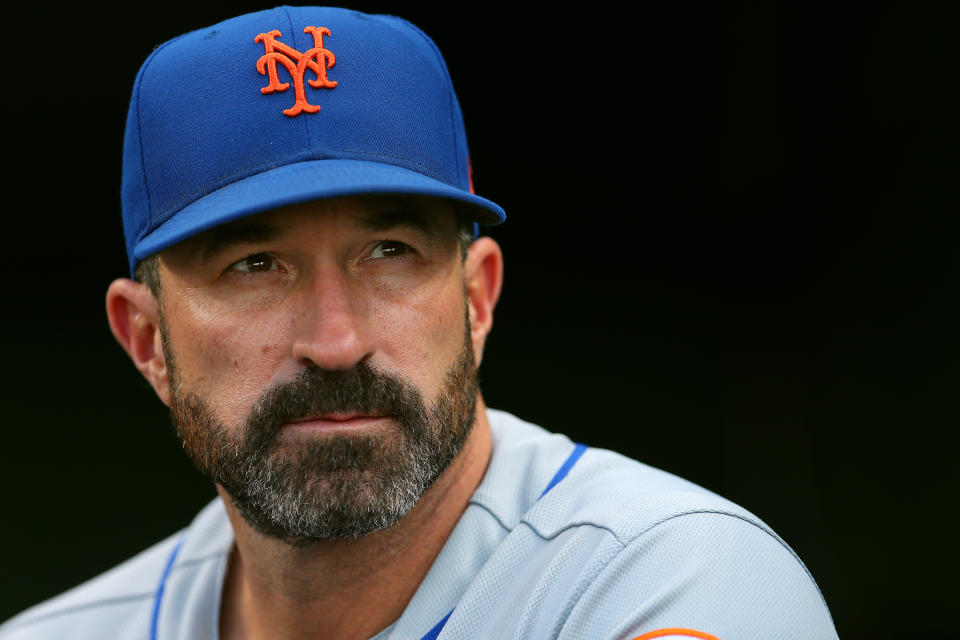Callaway: My Mets need a Miracle, too

NEW YORK -- To the wish list of things the New York Mets need to climb back into the NL East race -- a top-line starting pitcher, middle relief help, a reliable closer and a 2009 edition of Robinson Cano -- manager Mickey Callaway on Friday added one more item.
“It’s going to take a miracle,’’ Callaway said in a radio interview before the Mets began a three-game series against the Atlanta Braves, who lead them by 11 games in the standings, at Citi Field. “But the Mets have seen miracles before.’’
That kind of honesty from a manager is rarely welcomed by the owner of a baseball team, and the reaction of Mets COO Jeff Wilpon was not immediately available.
But Callaway was likely referencing this weekend’s celebration of the Miracle Mets of 1969, who reversed seven years of futility to shock the world, and especially the heavily-favored Baltimore Orioles, to win their first World Championship.
He was repeating a theme he had begun a few minutes earlier at his pre-game news conference, that his team, eight games below .500 at the halfway point of the season, might still be able to rally over the second half.
“Thirty years later, they’re getting celebrated because they did something that a lot of people in the moment didn’t think they were going to do,’’ Callaway said, screwing up the match but not the sentiment. “They were probably sitting here at this same time, halfway through the season, probably getting some of the same questions. I don’t know exactly what happened. But I’m sure it was some of the same narrative, and they overcame it. And that’s what we’re trying to do every single day.’’
In fact, there are very few similarities between the two teams. After 80 games of the 1969 season, the Mets were 46-34 and in second place, 4-½ games behind the Chicago Cubs. In a much different offensive era, their leading home run hitter, Tommie Agee, his 26 all season, one fewer than rookie Pete Alonso already has. But instead of Jacob deGrom, Noah Syndergaard and Steven Matz, the names in their starting rotation were Tom Seaver, Jerry Koosman and Gary Gentry. Instead of Edwin Diaz and Seth Lugo, the names in the bullpen were Nolan Ryan and Tug McGraw.
And in Game 81, Seaver would take a perfect game into the ninth inning against the Cubs, the game that established them as legitimate, if unlikely, pennant contenders.
Even at their lowest point - the 69 Mets dropped 10 games behind the Cubs on August 13 after being swept in a doubleheader by the Houston Astros -- they were still 11 games over .500 (62-51) and won 38 of their last 49 games to finish at 100-62, eight games ahead of the Cubs.
These Mets would have to go 53-29, a .646 clip, just to reach 90 wins. Although they began the season 5-1, they have not been above .500 since May 2, when they were 16-15. Following the current three-game series against the Braves, the Mets face a two-game series at home against the Yankees and three more at home against the Phillies, who just swept a four-game series from them at Citizens Bank Park.
Miracles may not have been outlawed in Flushing, but they certainly appear to be in short supply.
On Friday night, deGrom, the reigning NL Cy Young winner, surrendered a long two-run home run to Austin Riley in the second inning and another run on a hit, a stolen base, a groundout and a sacrifice fly in the third. He left after six innings, having thrown 107 pitches, trailing 3-1. The Mets cut it to 3-2 in the seventh but left the bases loaded when Jeff McNeil, their best hitter, struck out on a pitch in the dirt, and Pete Alonso, their most dangerous bat -- he had hit his 28th homer in the fourth -- lined out to left.
The next inning, the bullpen imploded once again, Robert Gsellman loading the bases on two singles and a hit batter, and then surrendering a bases-clearing double to Johan Camargo, the weakest bat in a strong Braves lineup.
Asked after the game about the “miracle’’ comment, Callaway downplayed is as “just a play on words with the 50th anniversary and all that.’’
But he acknowledged that the Mets, who fell to season lows nine games below .500 and 12 games out of first place, were rapidly approaching that stage of their season.
“It doesn’t have to be a miracle, but we need to get it going,’’ he said. “We have not put ourselves in a good spot to this point. We do have a lot of games left. But if we don’t change what’s been happening, if it keeps on going like this, heck, it would take a miracle. We got to start now. We got to start tomorrow, start tonight. Go home think about what’s been going on and come in tomorrow with a plan and work the plan.’’
Which begs the question: Can you really plan a miracle?

